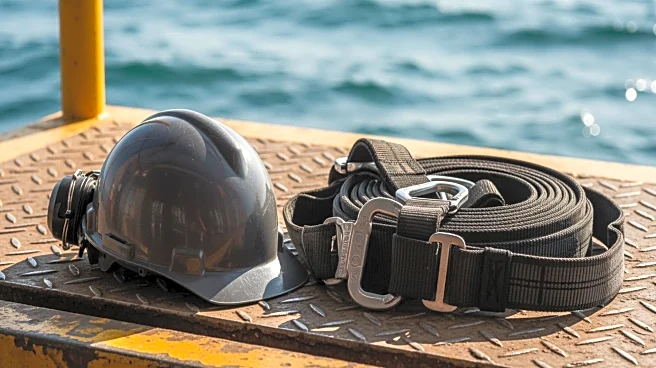What's Happening?
Offshore Energies UK (OEUK) has introduced a new safety policy requiring North Sea oil and gas rig workers to weigh under 124.7kg when fully clothed. This measure ensures workers can be safely winched onto rescue helicopters during emergencies. The policy,
set to be fully enforced by November 2026, affects approximately 5,000 offshore workers. OEUK plans a phased rollout, starting with an awareness phase followed by a transition period to help workers adapt. Employers are encouraged to provide weight-management and wellbeing support to assist workers in meeting the new requirements. The initiative aims to enhance safety during helicopter rescue operations by adhering to the maximum load limit.
Why It's Important?
The implementation of a weight limit for offshore workers underscores the importance of safety in high-risk environments. By ensuring workers can be safely evacuated during emergencies, the policy aims to prevent accidents and fatalities. The initiative also highlights the role of employers in supporting employee health and wellbeing, promoting sustainable weight management practices. This policy may influence industry standards, encouraging other sectors to adopt similar measures to enhance workplace safety. Additionally, it raises awareness about the challenges of maintaining physical health in demanding work environments, prompting discussions on employee support and wellness programs.
What's Next?
As the policy is rolled out, OEUK will monitor its impact on offshore workers and adjust support measures as needed. Employers may introduce new wellness initiatives, such as nutrition education and fitness programs, to help workers meet the weight requirements. The policy could lead to broader industry discussions on employee health and safety, potentially influencing regulations in other sectors. Stakeholders, including workers and employers, may engage in dialogue to address concerns and ensure the policy is implemented effectively and fairly.
Beyond the Headlines
The introduction of weight limits for offshore workers raises ethical considerations regarding employee privacy and autonomy. Balancing safety requirements with respect for individual circumstances is crucial to avoid stigmatization and discrimination. The policy may prompt discussions on the broader implications of workplace health initiatives, including the role of employers in supporting holistic employee wellbeing. Additionally, the focus on weight management highlights societal challenges related to health and lifestyle, encouraging a shift towards more inclusive and supportive workplace cultures.

















